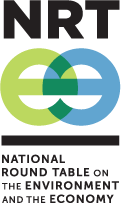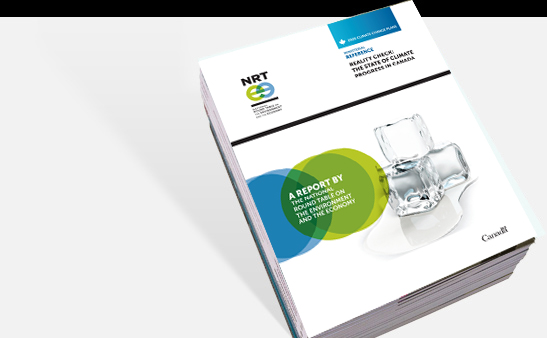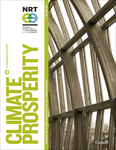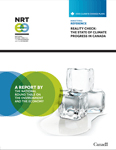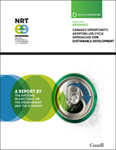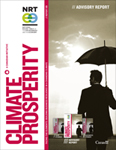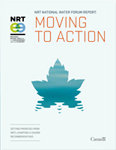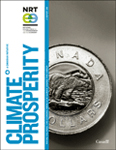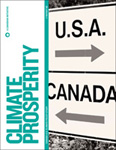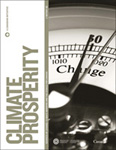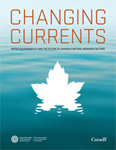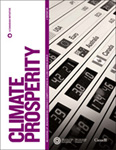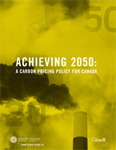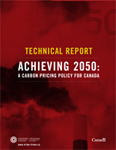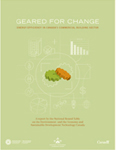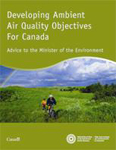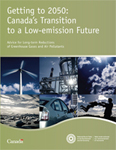News Release – January 7, 2008
Canada needs economy-wide price on carbon emissions as soon as possible to achieve 65% reductions in GHG emissions by 2050 concludes National Round Table report
 Ottawa, January 7, 2008 – Canada can achieve deep greenhouse gas (GHG) emission reductions by 2050, but only by putting a price on carbon emissions throughout the entire Canadian economy beginning as soon as possible, concludes the National Round Table on the Environment and the Economy (NRTEE) in a new climate change report released today entitled Getting to 2050: Canada’s Transition to a Low-emission Future.
Ottawa, January 7, 2008 – Canada can achieve deep greenhouse gas (GHG) emission reductions by 2050, but only by putting a price on carbon emissions throughout the entire Canadian economy beginning as soon as possible, concludes the National Round Table on the Environment and the Economy (NRTEE) in a new climate change report released today entitled Getting to 2050: Canada’s Transition to a Low-emission Future.
At the request of the Minister of the Environment, the NRTEE explored potential scenarios for how Canada could achieve deep, long-term GHG emission reduction targets (20% by 2020 and 60% to 70% by 2050 from current levels), as well as air pollutants reduction targets (50% and 80% by 2050). The report sets out a framework for how Canada can transition to a low-emission future and achieve these long-term emission reductions.
The central recommendation of the report is to establish an economy-wide price signal for carbon emissions as soon as possible. The NRTEE research shows that the most effective and efficient policy that would result in deep GHG emission reductions is a market-based policy, such as an emissions tax, a cap-and-trade system, or a combination of the two. In order to achieve the deep emission reduction target, this policy would need to be complemented by other sector-specific regulatory measures to force emission reductions from those parts of the economy that do not respond to a price signal.
“Our analysis shows that putting a price on emissions is the most effective tool to achieve deep GHG reductions over the long-term” said NRTEE Chair Glen Murray. “An early and clear price signal is needed to influence the investment decisions by industry in the technology and innovation required to achieve deep reductions and also to influence consumer decisions and behaviour.”
The NRTEE report sets out five important “enabling conditions” that should be reflected in Canada’s long-term climate change policy framework. These are:
- Canada will have to act in concert with the world, to address competitiveness issues.
- Policy certainty beyond the short term is critical, to ensure predictability for new investments.
- An economy-wide emission price signal with complementary regulatory policies is necessary, to foster investment, technology deployment, and change consumer behaviour.
- Technology deployment is imperative, and will need to be wide-spread throughout all segments of the economy.
- An integrated approach to climate change and air pollution should be pursued, to reduce costs and improve health outcomes.
The Round Table’s analysis concludes that the government’s medium and long-term targets are achievable with the equivalent impact on Canada’s GDP of 1 to 2 “years of lost GDP” over the 44-year period from 2006 to 2050.
“Delaying action comes with unnecessarily high economic and environmental risk.” stated Murray. “Our research shows that a faster, deeper pathway to achieve the government’s long-term GHG reduction targets of 20% by 2020 and 65% by 2050, has the least overall economic impact in the long-run, and better environmental outcomes resulting in the equivalent of 5 years of no GHG emissions into the atmosphere over this period as we meet our targets.”
The report recommends an integrated approach for reducing GHG and air pollutant emissions. A key finding of the research is that an integrated approach may result in lower prices associated with GHG emission reductions and greater air pollutant reductions.
The NRTEE also calls for the establishment of a Canada-wide plan as soon as possible that leads to better coordination of federal, provincial and territorial GHG emission reduction policies.
-30-
About the NRTEE
The National Round Table on the Environment and the Economy (NRTEE), an independent federal agency, is dedicated to exploring new opportunities to integrate environmental conservation and economic development, in order to sustain Canada’s prosperity and secure its future.CONTACT
For more information or media inquiries contact:
Moira Forrest
Manager of Communications, NRTEE
Tel: 613-992-7157
Cell: 613-290-6402
Fax: 613-992-7385
Email: forrestm@nrt-trn.ca
